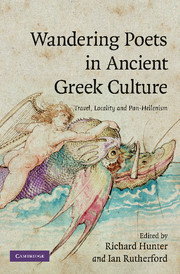Book contents
- Frontmatter
- Contents
- List of figures
- Notes on contributors
- Acknowledgements
- List of abbreviations
- 1 Introduction
- 2 Hittite and Greek perspectives on travelling poets, texts and festivals
- 3 Thamyris the Thracian: the archetypal wandering poet?
- 4 Read on arrival
- 5 Wandering poets, archaic style
- 6 Defining local identities in Greek lyric poetry
- 7 Wandering poetry, ‘travelling’ music: Timotheus' muse and some case-studies of shifting cultural identities
- 8 Epigrammatic contests, poeti vaganti and local history
- 9 World travellers: the associations of Artists of Dionysus
- 10 Aristodama and the Aetolians: an itinerant poetess and her agenda
- 11 Travelling memories in the Hellenistic world
- Bibliography
- Index
11 - Travelling memories in the Hellenistic world
Published online by Cambridge University Press: 04 July 2009
- Frontmatter
- Contents
- List of figures
- Notes on contributors
- Acknowledgements
- List of abbreviations
- 1 Introduction
- 2 Hittite and Greek perspectives on travelling poets, texts and festivals
- 3 Thamyris the Thracian: the archetypal wandering poet?
- 4 Read on arrival
- 5 Wandering poets, archaic style
- 6 Defining local identities in Greek lyric poetry
- 7 Wandering poetry, ‘travelling’ music: Timotheus' muse and some case-studies of shifting cultural identities
- 8 Epigrammatic contests, poeti vaganti and local history
- 9 World travellers: the associations of Artists of Dionysus
- 10 Aristodama and the Aetolians: an itinerant poetess and her agenda
- 11 Travelling memories in the Hellenistic world
- Bibliography
- Index
Summary
A DRAMATIC PERFORMANCE OF ENVOYS IN THE ASSEMBLY OF XANTHOS
Those citizens of Xanthos who attended the assembly on 2 Aoudnaios of the year 206 BC, a winter morning, late in November, were unexpectedly rewarded for their willingness to fulfil their citizen duties. For a rather uncommon event awaited them – not the usual agenda of honouring a benefactor or deciding about how to cover a deficit, but the appearance of three men from a distant place most of them had never heard of: Kytenion in Doris. These three men, Lamprias, Ainetos and Phegeus, equipped with two letters of recommendation by the Dorians and the Aetolians, but also equipped with their eloquence, fascinated the Xanthians with their lecture so much that the decree voted on by the assembly gives an unusually lengthy report of their oral presentation, thus providing an interesting insight into oral performances in the popular assembly. The three envoys of Kytenion requested financial aid for the reconstruction of the fortification wall of their city. They supported this request with a common argument of Hellenistic diplomacy: kinship.
The oral presentation of the envoys is referred to with the terms apologizesthai (‘to give an account’) and dialegesthai (here not in the sense ‘to hold converse with someone’, but rather ‘to present a discourse, to give a lecture’). The latter meaning of dialogos and dialegesthai is attested, e.g., in connection with the rhetorical competition which took place during the festival of the Eleutheria and to which I shall return later.
- Type
- Chapter
- Information
- Wandering Poets in Ancient Greek CultureTravel, Locality and Pan-Hellenism, pp. 249 - 269Publisher: Cambridge University PressPrint publication year: 2009
- 2
- Cited by

